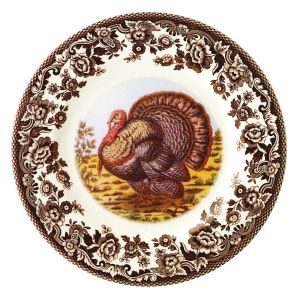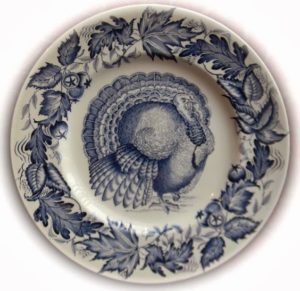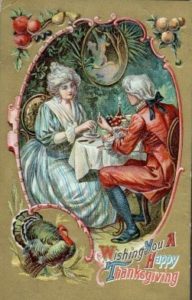
In Thanksgiving week, it is natural to think about turkey; and it is equally natural for Austen Variations members to think about turkey in Jane Austen’s life and writing. We need not wonder, however, whether she ate turkey, or liked it; for it is known that she did both. There are symptoms of turkey enthusiasm in her correspondence, and it is evident that the bird was considered a festive and special dish, much as it is today. Perhaps it was all the more prized because turkeys were not available from the supermarket wrapped in plastic; they had to be carefully raised, usually by the lady of the house, and the killing and eating of a turkey was an event. Mrs. Austen was proud of her poultry, which she called her “riches,” and the Austens often sent presents of turkey to friends and family.
Jane Austen’s first letter mentioning the subject was written on 11 June 1799, when she was twenty-three. She wrote to Cassandra, who was then at Steventon, while Jane was staying at Queen’s Square, Bath, with her brother Edward Knight and his family. She mentions Edward’s oldest son, little Edward, then five years old:
“Edward desires his Love to You, to Grandpapa, to Anna, to little Edward, to Aunt James & Uncle James, & he hopes all your Turkies & Ducks & Chicken & Guinea Fowls are very well.”
Little Edward shows a complete and amusing awareness of all the kinds of fowl that were kept on his grandparents’ farm.
The next “turkey letter” was written Sunday 25 January 1801 from Steventon, to Cassandra, then staying with Edward and his family at their home at Godmersham Park in Kent. The party was about to go to London:
“I dare say you will spend a very pleasant three weeks in town. I hope you will see everything worthy [of] notice, from the Opera House to Henry’s office in Cleveland Court; and I shall expect you to lay in a stock of intelligence that may procure me amusement for a twelvemonth to come. You will have a turkey from Steventon while you are there, and pray note down how many full courses of exquisite dishes M. Halavant converts it into.” (Halavant was their brother Henry’s French chef.)
Years later, on November 30 1812, Jane Austen wrote from Chawton to her friend Martha Lloyd, who lived with her family, but then was away visiting friends, the Dundas family, at Kintbury. Perhaps the main purpose of her letter was to inform Martha that Pride and Prejudice was sold, but the fact is buried amidst much other news and gossip, including some talk about turkeys.
“P. & P. is sold. Egerton gives £110 for it. – I would rather have had £150, but we could not both be pleased, & I am not at all surprised that he should not chuse to hazard so much. – Its being sold will I hope be a great saving of Trouble to Henry, & therefore must be welcome to me. – The Money is to be paid at the end of the twelvemonth.”
She then starts thinking about presents to others, as Christmas season is approaching:
“You have sometimes expressed a wish of making Miss Benn some present; – Cassandra & I think that something of the Shawl kind to wear over her Shoulders within doors in very cold weather might be useful, but it must not be very handsome or she would not use it. Her long Fur tippet is almost worn out.”
And then at last she comes to the subject of turkey, given just as much attention in this letter as her publication, but perhaps turkeys interested Martha quite as much:
“If you do not return in time to send the Turkey yourself, we must trouble you for Mr. Morton’s direction again, as we should be quite as much at a loss as ever. It becomes now a sort of vanity with us not to know Mr. Morton’s direction with any certainty. – We are just beginning to be engaged in another Christmas Duty, & next to eating Turkies, a very pleasant one, laying out Edward’s money for the Poor; & the Sum that passes through our hands this year is considerable, as Mrs. Knight left £20 to the parish.” (This is the Mrs. Knight who with her husband, had made Edward their heir; she had died a few weeks earlier, and he formally adopted the Knight name.)
Jane Austen’s last “turkey” letter was written from Chawton in December, 1816, seven months before her death, to her niece Anna. Anna was then twenty-three and had married Benjamin Lefroy in 1814. They were then living in Wyards, a farmhouse near Chawton. Although already ill, Jane’s sense of humour was indomitable as ever:
My dear Anna
Your Grandmama is very much obliged to you for the Turkey, but cannot help grieving that you should not keep it for yourselves. Such Highmindedness is almost more than she can bear. – She will be very glad of better weather that she may see you again & so we shall all.”

That is all that Jane Austen wrote about turkey in her letters, but there are also her novel passages on the subject to consider. In Mansfield Park turkey plays an important part in several scenes. The fowl action begins when Mary Crawford’s sister Mrs. Grant complains about her housekeeping:
“…what is worse, cook has just been telling me that the turkey, which I particularly wished not to be dressed till Sunday, because I know how much more Dr. Grant would enjoy it on Sunday after the fatigues of the day, will not keep beyond to–morrow. These are something like grievances, and make me think the weather most unseasonably close.”
“The sweets of housekeeping in a country village!” said Miss Crawford archly. “Commend me to the nurseryman and the poulterer.”
“My dear child, commend Dr. Grant to the deanery of Westminster or St. Paul’s, and I should be as glad of your nurseryman and poulterer as you could be. But we have no such people in Mansfield. What would you have me do?”
“Oh! you can do nothing but what you do already: be plagued very often, and never lose your temper.”
“Thank you; but there is no escaping these little vexations, Mary, live where we may; and when you are settled in town and I come to see you, I dare say I shall find you with yours, in spite of the nurseryman and the poulterer, perhaps on their very account. Their remoteness and unpunctuality, or their exorbitant charges and frauds, will be drawing forth bitter lamentations.”
Mary declares that she means to be rich (“A large income is the best recipe for happiness I ever heard of. It certainly may secure all the myrtle and turkey part of it”) which causes Edmund some concern. Then the Grants invite Edmund and Fanny to dinner the next day, and Mrs. Grant adds, “’And you know what your dinner will be,’ said Mrs. Grant, smiling—’the turkey, and I assure you a very fine one; for, my dear,’ turning to her husband, ‘cook insists upon the turkey’s being dressed to–morrow.’ ‘Very well, very well,’ cried Dr. Grant, ‘all the better; I am glad to hear you have anything so good in the house. But Miss Price and Mr. Edmund Bertram, I dare say, would take their chance. We none of us want to hear the bill of fare. A friendly meeting, and not a fine dinner, is all we have in view. A turkey, or a goose, or a leg of mutton, or whatever you and your cook chuse to give us.’”
We conclude our musings on Jane Austen and turkey with the famous closing of Emma, in which Emma and Mr. Knightley wish to marry, but hesitate because of the misery of her father. In this scene, the humble turkey rises to the level of deus ex machina, and facilitates the approach of Emma’s wedding, with its “perfect happiness.”
“In this state of suspense they were befriended, not by any sudden illumination of Mr. Woodhouse’s mind, or any wonderful change of his nervous system, but by the operation of the same system in another way.–Mrs. Weston’s poultry-house was robbed one night of all her turkeys–evidently by the ingenuity of man. Other poultry-yards in the neighbourhood also suffered.–Pilfering was housebreaking to Mr. Woodhouse’s fears.–He was very uneasy; and but for the sense of his son-in-law’s protection, would have been under wretched alarm every night of his life… The result of this distress was, that, with a much more voluntary, cheerful consent than his daughter had ever presumed to hope for at the moment, she was able to fix her wedding-day–and Mr. Elton was called on, within a month from the marriage of Mr. and Mrs. Robert Martin, to join the hands of Mr. Knightley and Miss Woodhouse.”
Happy Thanksgiving, and may we all be thankful for our dinners, whether or not they contain turkey!


8 comments
Skip to comment form
Loved the “turkey” excerpts! Thanks for sharing.
Author
Thanks, Jennifer!
I think she really enjoyed all the different ways Henry’s chef could create a meal with just a turkey!
Author
Carole, yes, doesn’t she seem to be making a bit of gentle fun of Henry, for his pretensions in having a French chef!
It seems the turkey was by this time regarded as a bird one could cook and eat for special occasions. In the letters they are eating the turkey Christmas time; they make a fuss to about it: writing Martha to make it comes — it’s not a negligible food. In the novels, we see Dr Grant is a luxurious for he doesn’t need a holiday — also that Mr Woodhouse while absurd might want to protect this “special” bird. I note the Woodhouses have several. In this era many (for all I know most) people were very lucky to get one hot meal every week.
Ellen
Thanks, Ellen, it was fun to research about turkeys in Austen…I swear I think it’s fun to research almost ANYTHING in Austen, you know?
I am curious about what Jane’s turkeys looked like. The turkeys on the plates shown with your post are very like present day American turkeys. Are those plates vintage or modern? The wild turkeys I have seen in Minnesota are skinny creatures in comparison and the turkeys available in 1991 in Bucharest Romania were looked more like how I would imagine the wild turkeys would look without their feathers.
Very, very interesting. I’ve never thought of the Austens as caring for turkeys. My daughter, who lives in the country in VA, had a wild turkey park itself in the middle of her lawn where it cared for its chicks. It went nuts when anyone came out the front door, and it was so big that no one argued with her! Hope you had a good holiday.